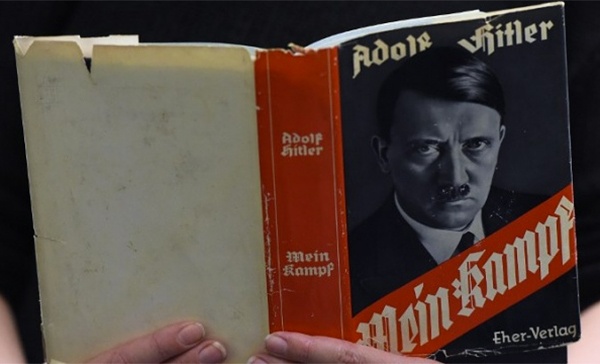Udit Bhatia discusses attitudes to, and ignorance of Hitler in India.

As I wait at a traffic signal on Delhi’s impatient roads, a young book hawker seizes the opportunity. In addition to the latest volume of magazines, he has a range of books on display: Paulo Coelho, Chetan Bhagat and Dan Brown spread in his hands. Hitler’s Mein Kampf sits comfortably among these even as it causes furore in Germany, where it is now in the public domain after its 70-year copyright expired. I am aware that this unsurprising sight may trouble many outside India. In New Delhi, Hitler is found not just at traffic signals but also in air-conditioned bookstores and in the many street-shops that sell books. The 12th most sold history book on Amazon India, Mein Kampf has attracted more reviews than the first volume of the Harry Potter series. Most of these reviews are favourable. Jaico Publishing House reports selling over 15,000 copies of Mein Kampf in a year. Its website, interestingly, omits any reference to the Holocaust in its description of the book, claiming that Mein Kampf gives its reader “an insight into one of the greatest tyrants of this century, his political ideals, beliefs and motivation, and his struggle to consolidate Germany into one great nation”.
It is not just his books—the Hitler brand seems to attract other merchants too. In 2012, a clothing store named after him in the state of Gujarat was renamed after complaints were received from the Israeli embassy. In 2015, an ice-cream cone named Hitler in the state of Uttar Pradesh caused similar controversy. Balasaheb Thackeray, leader of the far right party Shiv Sena in the state of Maharashtra, had once voiced his admiration for Hitler due to his ability to rule with an iron fist. While there are no statistics to back up this claim, anecdotal evidence from newspapers and interviews to researchers also suggests that many students of management read Mein Kampf as a textbook of sorts for organisational strategy.
India’s consumption of Hitler, however, does not mean that there is coherent ideological support for his wider political views. For the Hindu right, in particular, such affinity with Nazism would be tenuous to say the least. While they might, like Thackeray, claim to admire him for his strictness as a leader, many profess their fondness for Israel due to its “no-nonsense” response to the “Islamic” threat. Further, consider Mein Kampf’s popularity among students of management. This seems to have more to do with the culture of management schools, which value hierarchical organisation and top-down decision-making. Here, Hitler becomes emblematic of a successful manager in a way that separates his organisational capabilities from other aspects of his political views. Something similar might be said of the Hitler brand in the wider marketplace. These may often be grounded in a popular version of the figure that has emerged in India, which associates him with qualities like “non-partisanship” or “patriotism”. Owners of the ice-cream store and producers of the ice-cream named after him both pleaded ignorance about Hitler’s past, attributing the name of their businesses to relatives known for their “strictness”.
Researcher Suman Gupta also called for scepticism of the view that Hitler enjoyed particular traction in India compared to other countries. She suggested that the heightened visibility of Mein Kampf in India does not necessarily mean that his ideas are circulated more there than in other contexts. The text is easily available to download for free and this means that readers in North America and Europe may be able to consume Mein Kampf without this being reflected in book sales statistics, which have drawn interest in the Indian context. This is significant because access to the internet in India remains at about 30 per cent of its population, compared to 90 per cent in the United States, United Kingdom and Germany.
Finally, Nate Currier’s research shows massive ignorance about Hitler’s views, actions and the Holocaust. I myself learned precious little about him during my schooling in India. The second world war was only a small component of the history section in a course on “social studies” – one that teachers dedicated perhaps one or two classes to during eighth grade (for 14 year-olds). Things seem to have changed somewhat since then, with an entire chapter on Hitler and the Holocaust added to textbooks produced by the National Council of Education, Research and Training. But in India’s decentralised system of education, such change is not always universal. Currier’s analysis of the official standard textbook for social science in the state of Tamil Nadu reveals an entirely different picture: “One section did mention that he ‘created a strong unified and highly centralised despotic state’, was cruel to women, outlawed other political parties and removed public liberties. But these facts were interspersed between descriptions about his ‘commendable’ economic work and how ‘many schools were opened and illiteracy was eradicated’. His foreign policy was described as: ‘forward and aggressive’”. The book does not mention its concentration camps, the Holocaust or its death toll.
Udit Bhatia is a doctoral student in political theory at Oxford.






















